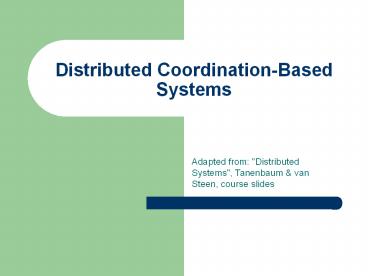Distributed Coordination-Based Systems - PowerPoint PPT Presentation
Title:
Distributed Coordination-Based Systems
Description:
Adapted from: 'Distributed Systems', Tanenbaum & van Steen, course s. Need for Coordination ... so far we have mostly focused on request/reponse types of ... – PowerPoint PPT presentation
Number of Views:243
Avg rating:3.0/5.0
Title: Distributed Coordination-Based Systems
1
Distributed Coordination-Based Systems
- Adapted from "Distributed Systems", Tanenbaum
van Steen, course slides
2
Need for Coordination
- so far we have mostly focused on request/reponse
types of interactions between a client and a
server - means the client and server are tightly coupled
- client blocks until server delivers response
- what if the one of the parties crashes?
- what if more than two parties need to be involved?
3
Introduction to Coordination Models
- A taxonomy of coordination models (adapted from
cabri.g2000)
4
Mailbox Model
- it is in particular supported by the concept of
"active objects" or "actors" - Actors run in their own thread of execution
- they communicate via asynchronous method calls
- some work has been done to implement distributed
actors, but it is still mostly a research topic
5
Meeting Oriented
- To some extent, the Java event model allows for
looser coupling between the client and the server - the server, as an event source, does not
explicitly know who is listening - this is the basis of publish-subscribe
- Without such coupling, the client often has to
keep polling the server
6
Meeting Oriented
- The principle of a publish/subscribe system as
implemented in TIB/Rendezvous.
7
Coordination Model (2)
- The overall architecture of a wide-area
TIB/Rendezvous system.
8
Basic Messaging
Attribute Type Description
Name String The name of the field, possibly NULL
ID Integer A message-unique field identifier
Size Integer The total size of the field (in bytes)
Count Integer The number of elements in the case of an array
Type Constant A constant indicating the type of data
Data Any type The actual data stored in a field
- Attributes of a TIB/Rendezvous message field.
9
Generative CommunicationsTuple-spaces
- JavaSpaces is an implementation of the concept of
tuple-spaces, and is used by Jini
10
What is Jini?
- makes computers and devices able to quickly form
impromptu systems unified by a network - based on Java (JDK1.2)
- open source (SCSL license)
11
Jini
- Jini Services are represented and accessed
through a Java Interface - mobility of the implementation of the services is
made possible using RMI
12
The Jini Architecture Key concepts and
components
- Services
- Lookup Service
- RMI
- Security
- Leasing
- Transactions
- Events
13
Jini Lookup Service
- Repository of available services
- Stores services as Java objects
- Clients download services on demand
14
How it works
15
The Jini Lookup Service (1)
Field Description
ServiceID The identifier of the service associated with this item.
Service A (possibly remote) reference to the object implementing the service.
AttributeSets A set of tuples describing the service.
- The organization of a service item.
16
The Jini Lookup Service (2)
Tuple Type Attributes
ServiceInfo Name, manufacturer, vendor, version, model, serial number
Location Floor, room, building
Address Street, organization, organizational unit, locality, state or province, postal code, country
- Examples of predefined tuples for service items.
17
Discovery Protocol
- a process of finding lookup services
- used by both Jini services and clients
- Discovery Model
- Multicast discovery for LAN
18
Leasing
- For managing resources based on time duration
- leases are time-based grants of resources or
services - loose contracts between grantor and holder
- can be cancelled, renewed, allowed to expire...
19
Communication Events
- Using events in combination with a JavaSpace
20
Synchronization of Transactions
- The general organization of a transaction in
Jini. Thick lines show communication as required
by Jini's transaction protocol
21
Set-up
- Start a Web server (to enable class downloading)
- Start the RMI daemon
- Start the lookup service (Reggie)
- Optional run the Transaction Manager
- Optional run the JavaSpaces Service
- Run the services
22
Comparison of TIB/Rendezvous and Jini
Issue TIB/Rendezvous Jini
Major design goal Uncoupling of processes Flexible integration
Coordination model Publish/subscribe Generative communication
Network communication Multicasting Java RMI
Messages Self-describing Process specific
Event mechanism For incoming messages As a callback service
Naming services None Lookup service
Transactions (operations) Messages Method invocations
Transactions (scope) Single process (see text) Multiple processes
Locking No As JavaSpace operations
Caching and replication No No
Reliable communication Yes Yes
Process groups Yes No
Recovery mechanisms No explicit support No explicit support
Security Secure channels Based entirely on Java































